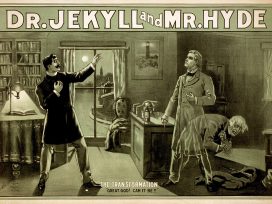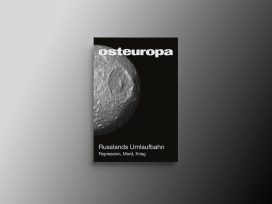American Russophobia in the age of liberal decline
Accusations of Russian interference have become the primary route through which to undermine Donald Trump. In order to sustain public outrage, media and political elites provide a constant flow of leaks, rumours and conspiracy theories. Failing liberal self-confidence is to blame for the return of Cold War rhetoric, argues Andrei P. Tsygankov.
The era of great hopes and expectations generated by the end of the Cold War has given way to an emotionally bitter conflict of values between the United States and Russia. Since 2012 at the latest, it has become common to hear American and Russian media accusing the leaders of their respective countries not only of violating international law, but also of developing political systems based on cynicism, injustice, and disregard for human dignity. On many occasions, US officials and members of the political class have compared the actions of Vladimir Putin with those of Adolf Hitler and portrayed the Kremlin’s style of government as being deeply corrupt and based on the repression of opposition, the reward of political cronies, and on military aggression abroad. Russia, meanwhile, sees itself as defending its political system and legitimate interests from economic, political and military interference by the West. Comments by Russian officials indicate that they do not hold in high regard the institutions of competitive elections, the free media and the market economy. On the contrary, they believe that these serve as a cover for narrowly based yet excessively powerful special interest groups.1
Under President Donald Trump, US–Russian relations have entered a new phase. Trump’s election revealed a major value divide within American society. Whereas Trump’s opponents have remained committed to world order based on liberal institutionalist ideas, the US president favours a return to military strength, unilateralism and economic nationalism. During the election campaign, he took issue with liberal characterizations of Russia as an ‘enemy’ to be contained and argued for lifting sanctions and partnering with Moscow in the area of counter-terrorism. This has caused the liberal media to attack Trump as a semi-autocratic proxy of Putin.2 Ideologically, Trump’s views bear some similarity with those of Putin and stress strong executive power and primacy in international affairs.3
The Russia issue has become central in the new internal divide between the Trump administration and the liberal establishment. To a significant extent, the divide reflects the latter’s frustration with the loss of elections and the respective share of political influence. Some neoconservative groups within the Republican Party have also been critical of Trump’s Russia views for their own political reasons.4 However, if the two countries are to move beyond viewing each other as potential enemies, they must find a way to reframe their values in non-confrontational terms.
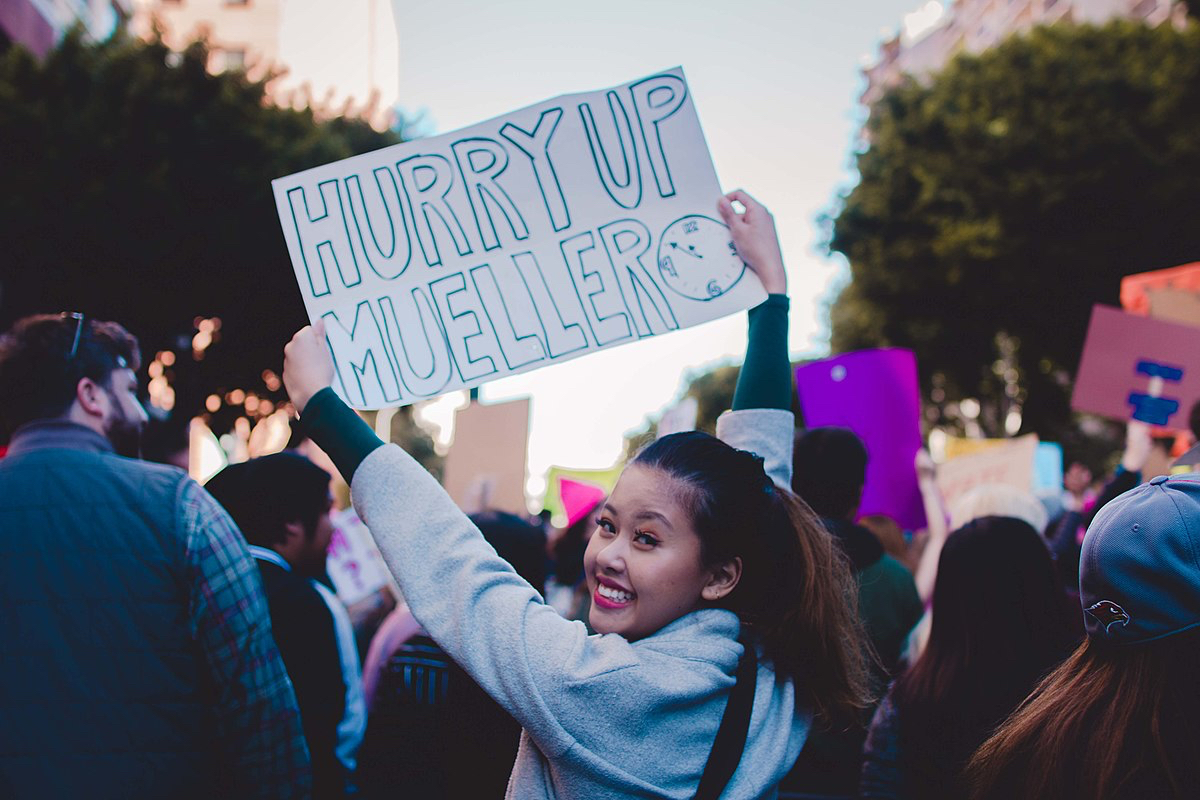
Los Angeles Women’s March (2018). Photo source: Wiki Commons
The ‘smell of treason’ and liberal paranoia
The election of Trump as US president has prompted the liberal media to actively discuss new Russia-related fears and conspiracy theories. Two such fears have been that alleged Russian cyber interference in the US elections amounted to an act of war and that Putin was now ruling America through his proxies. Members of the US political class endorsed these views and helped to spread the fears. The question of Russia’s motives, even if one assumes that meddling took place, was never seriously explored.5
The first fear likely came to the media from Hillary Clinton’s inner circle. The liberal New Yorker claimed that members of the circle believed that the Obama administration deliberately downplayed the DNC hacking by the Kremlin. ‘We understand the bind they were in,’ one of Clinton’s senior advisers said. ‘But what if Barack Obama had gone to the Oval Office, or the East Room of the White House, and said, “I’m speaking to you tonight to inform you that the United States is under attack…” A large majority of Americans would have sat up and taken notice. … It is bewildering – it is baffling – it is hard to make sense of why this was not a five-alarm fire in the White House’.6 Commentators and pundits, including those with academic and political credentials, further developed the theory of the US under enemy attack. The former ambassador to Russia, Michael McFaul,7 wrote in The Washington Post that Russia attacked ‘our sovereignty’ and continues to ‘watch us do nothing’ because of partisan divides. He compared the Kremlin’s actions with Pearl Harbour or 9/11 and warned that Russia was likely to repeat assaults in 2018 or 2020.8 The historian Timothy Snyder went even further by linking the ‘war’ with the election of Trump, which he claimed was the basic aim of the enemy.9
Rather than viewing the hacking attacks as interference in domestic affairs, both Democrats and Republicans helped to promote the war theory. Chairman of the Senate Armed Services Committee John McCain stated, ‘When you attack a country, it’s an act of war’.10 Former vice president Dick Cheney called Russia’s alleged interference in the US election ‘a very serious effort made by Putin and his government, his organization’, pointing out that ‘in some quarters that would be considered an act of war’.11 Without calling for a military response, a number of Democrats also engaged in war rhetoric; Senator Ben Cardin, for example, referred to the Russia ‘attack’ as a ‘political Pearl Harbour’.12
The war rhetoric fits into a larger narrative developed by Democrats and liberal media, in which Trump is presented as being compromised by Russia and soft on the Kremlin. Writing in the New York Times on 14 February 2017, Thomas L. Friedman called for retaliation against Russia and praised the ‘patriotic’ Republican senators John McCain and Lindsey Graham for being tough on Trump.13 During her broadcast on 9 March, MSNBC host Rachel Maddow asked whether Trump was actually under Putin’s control. Citing Trump’s views, as well as examples of his associates travelling to Moscow, she told viewers that ‘we are starting to see what may be signs of continuing [Russian] influence in our country. Not just during the campaign but during the administration. Basically, signs of what could be continuing operation.’14 On 23 March, another New York Times writer, Nicholas Kristof, published a column entitled ‘There’s a Smell of Treason in the Air.’ In it, he argued that the FBI investigation into ‘whether another presidential campaign colluded with a foreign power so as to win an election … would amount to treason.’ Responding to Trump’s statement that his phone was tapped during the election campaign, the Washington Post columnist Anne Applebaum tweeted that ‘Trump’s insane “GCHQ tapped my phone” theory came from… Moscow.’15 McFaul and many others then endorsed and retweeted the message. Before that, members of the US establishment had on numerous occasions accused Russia and Kremlin-connected oligarchs of collusion with Trump’s officials. This then became a part of Special Counsel Robert Mueller’s investigation, although the political connection to the Kremlin has not yet been proven.
The liberal media fed off discussions, investigations and conspiracy theories about Russia within the political class and expert community in Washington. Much of what was written was based on rumours and mysterious leaks, possibly by members of the US intelligence community, claiming improper ties between Trump and Putin,16 as well as on the activities of liberal groups seeking to discredit Trump. For example, on 22 February 2017, politico.com reported that the Clinton-influenced Center for American Progress had brought in a former State Department official to run a new ‘Moscow Project’, while advocating the creation of an investigation into Trump’s ties to Russia.17 Many of the suspicions of Russian interference, including concerning the DNC hacking, were based on allegations of potentially ‘compromising’ behaviour on the part of Trump: praise of Putin, possible business dealings with Russian oligarchs, Trump’s former campaign manager Paul Manafort’s advisory ties to the deposed Ukrainian President Viktor Yanukovich, a ‘black dossier’ on Trump held by the Kremlin, compiled by an unidentified British intelligence officer and leaked to CNN, and the resignation of National Security adviser General Michael Flynn for not disclosing his contacts with Russian representatives.18
Taken together, all these things implied Kremlin interference in US domestic politics; viewed separately, however, each was questionable. Some of the charges could have also been directed at Hillary Clinton, who also has ties to Russian – not to mention Saudi Arabian – business circles and Ukrainian politicians. Other charges concerned political views and could not be counted as evidence. Still others, such as the ‘black dossier’, could have been a fabrication.19 Even the CIA and the FBI-endorsed conclusion about Russia attacking the DNC servers was questioned by some observers on the grounds of the intelligence agencies’ over-reliance on findings by one cybersecurity company, CrowdStrike. The International Institute for Strategic Studies, which provided the data used by CrowdStrike, later stated that the data was used erroneously and could not serve as proof of hacking.20
The crisis of liberal West
The politicized nature of the debate, the circulation of questionable leaks and dossiers compiled by unidentified individuals, and the lack of serious evidence, led many independent observers to conclude that the Russia story was more about Trump than Russia. Mueller’s investigation became increasingly focused on Trump associates’ business ties with Russia, as well as other violations of the law such as lying about their conversations with Russia’s ambassador.21 The Russia scandal was symptomatic of the poisonous state of relations between the US and Russia. The Democrats exploited this for derailing Trump, who during the election campaign had advocated normalization with the Kremlin. In other words, US–Russia relations have become a hostage of partisan domestic politics. As one liberal and tough critic of Putin wrote, Democratic lawmakers’ rhetoric of war ‘places Republicans – who often characterize themselves as more hawkish on Russia and defence – in a bind as they try to defend to the new administration’s strategy towards Moscow’.22 As Jesse Walker, an editor at Reason magazine and the author of The United States of Paranoia, pointed out,
There’s a difference between thinking that Moscow may have hacked the Democratic National Committee and thinking that Moscow actually hacked the election, between thinking the president may have Russian conflicts of interest and thinking he’s a Russian puppet … When someone like the New York Times columnist Paul Krugman declares that Putin ‘installed’ Donald Trump as president, he’s moving out of the realm of plausible plots and into the world of fantasy. Similarly, Clinton’s warning that Trump could be Putin’s ‘puppet’ leaped from an imaginable idea, that Putin wanted to help her rival, to the much more dubious notion that Putin thought he could control the impulsive Trump. (Trump barely seems capable of controlling himself.)23
There were two sides to the Russia story in the liberal discourse – rational and emotional. The rational side had to do with the pooling of resources by Clinton-affiliated circles and other anti-Russian groups in order to undermine Trump and his plans to improve relations with Russia. These resources included dominance within the liberal media and leaks by unidentified members of the intelligence community. The emotional side was the liberal elites’ ability to engage with fears of Russia within the US political class and the general public, which to a certain extent went back to old Cold War memories. Partly due to these memories, minority elites such as the one associated with Clinton were successful in evoking in the public liberal mind what historian Richard Hofstadter called the ‘paranoid style’ or ‘the sense of heated exaggeration, suspiciousness, and conspiratorial fantasy’.24 Mobilized by liberal media, Russophobia became an independent factor in the political struggle inside Washington. The public display of fear and frustration with Russia and Trump could only be sustained by a constant supply of new ‘suspicions’ and their intense discussion by the media.
Paranoia about Russia in the liberal media was symptomatic of America’s declining confidence in its own values. Following the terrorist attack on 11 September 2001, the disastrous war in Iraq, and the global financial crisis of 2008, US and European nations have been searching for ways to adapt to a new, increasingly unstable and regionalized world. The United States is now divided internally. In November 2016, following the presidential elections, 77 per cent of Americans perceived their country to be ‘greatly divided on the most important values’.25 Following the war in Iraq, US leadership could no longer inspire the same respect, and a growing number of countries viewed it as a threat to world peace.26 In response, the United States has moved away from trying to win hearts and minds, towards developing ‘digital’ and financial tools for engaging foreign activists and monitoring foreign governments. The power of example has increasingly been replaced with assertiveness, surveillance and bribery.
This lack of confidence was reflected in the exaggerated fear that Russia was capable of destroying the West’s values. Yet neither Russia nor Putin were omnipresent or threatening to destroy the United States’ political system. Mark Lawrence Schrad described fears of Russia as ‘increasingly hysterical fantasies’ and argued against viewing Russia as the global menace. Russis, he argued, is a political system that combines democratic and non-democratic characteristics, whose varied strategic interests deserve recognition and respectful engagement.27
If the Kremlin was indeed behind the cyberattacks, it was not for the reasons it was accused of. Rather than trying to subvert the US system, it was seeking to defend its own system against what it perceived as the US global policy of regime change and internal meddling – a policy that has a long history in the second half of the twentieth century.28 However, unlike during the Cold War, the contemporary global struggle is not for communism or capitalism, but for the assertion of global rules and regulations that favour different states. The Washington establishment assumes that America defines the rules of proper behaviour in international politics, while others simply follow those rules.
Is Russia doomed to be the negative Other?
The narrative of Russia as threatening neo-Soviet autocracy has been instrumental in confirming the identity of America as leader of the ‘free world’. The narrative is successful in part because old Cold War views have not been replaced by a different understanding of the new realities. Following the election of Trump, Russia’s otherness served to preserve the confidence of the liberal self. In addition, the United States continues to be guided by the geopolitical objective of remaining the sole superpower, something that also requires an image of the external other. As Anatol Lieven writes, ‘whipping up fear of Russia allows elites in both the USA and Europe to continue to structure their institutions and strategies around an adversary that is familiar, comfortable and fundamentally safe’.29
On the other hand, the Russian media narrative of the globally intrusive, dictatorial, and internally corrupt America serves to strengthen Russia’s self-perception as an independent great power guided by superior values and principles. Presenting democracy promotion and human rights as being inseparable from the United States’ hegemonic ambitions enables the Kremlin to rally support inside and outside Russia. Anti-American propaganda and conspiracy theories have been a powerful method in the Kremlin’s toolkit.30 In the age of global information competition, media serves to articulate and consolidate national symbols and emotions more than ever.
The clash of values in US–Russia relations was hardly inevitable: alternative strategies and ideas existed. Influential intellectuals, organizations, and members of the political class in both countries had voiced support for cooperation based on mutual interests such as counter-terrorism, regional stability and disarmament. Yet those advocating exclusive values, rather than inclusive solutions, prevailed time and again.31 This was because of a combination of two psychological factors: the perception of the other side’s recognition of one’s own values and interests; and the lack of self-confidence in one’s ability to promote or sustain one’s own values. The shift in the US towards a negative presentation of Russia was a response to the perceived global challenge to its interests and values, including from Russia. The Kremlin’s value strategy, on the other hand, was more regional and local, resulting from perceived western pressures and internal confidence. The annexation of Crimea, in particular, was a popular decision that provided the leadership with a strong confidence boost. Driven by such perceptions, the ruling elites abandoned the search for cooperation and adopted policies of unilateral protection of individual interests.
These value conflicts have roots in a cultural and political divide. Despite initial expectations, globalization has not replaced the world of nation-states, but rather introduced new conditions under which national identities, values and institutions express themselves by reviving old ideas and practices. As one US commentator wrote, it is abundantly clear that many in the West ‘underestimated the role of nationalism and other forms of local identity, including sectarianism, ethnicity, tribal bonds, and the like … It turns out that many people in many places care more about national identities, historic enmities, territorial symbols, and traditional cultural values than they care about ‘freedom’ as liberals define it.’32
Conflicts between the US and Russia are also rooted in history and politics. Immediately after the Cold War, the two nations did not view each other as adversaries and their leaders rarely used the emotional and mutually alienating language of exclusive values. This only started some twenty years later. However, in the interim, the two nations had failed to bridge the old cultural gap – largely because of existing and increasingly diverging political expectations. While Washington expected Russia to accept the new status of the USA as sole superpower, the Kremlin never relinquished its hopes of recovering its former global role in the post-Cold War era and expected the USA to respect its claim to be treated as an equal. It was only a matter of time before these radically different, indeed irreconcilable, expectations clashed, pushing the two countries towards rivalry – including in the realm of values.
The US media led the way in creating the narrative of a threatening neo-Soviet Russia before the American officials chose to exploit it. Although the American public did not hold an overwhelmingly negative image of Russia, public perceptions became more critical from the late 1990s, creating a space for the revival of the neo-Soviet, neo-Cold War narrative. In developing this narrative, the media was arguably less influenced by the public and more by various groups within the US political class. These groups were suspicious of Putin and by the mid-2000s widely publicized their view of the Russia’s deviation from the ‘right path’. In the eyes of the liberal media, Russia’s failure to build a western-style political system and to cooperate with the West in foreign policy confirmed these groups’ assessments.
Russia’s political system and values are, of course, quite different to those of the US. Yet they are not antithetical. In the Russia of the 1990s, the historically distinct values of Orthodox Christianity, communality and the strong state were seen as being compatible with liberal democracy. Some synthesis might have emerged were it not for interference of interstate politics and the Kremlin’s perception that the US had been ignoring Russia’s security interests. The country’s tradition of a powerful executive had centuries-long roots predating the Soviet state and even the tsarist system, and it is likely to continue to shape Russia’s political system.33 Criticism of this tradition as being prone to dictatorship and as posing a threat to western values is similar to criticism by Russian nationalists of western political systems as being unjust and inherently corrupt.
By the mid-2000s, the US leadership began to rely on negative perceptions of Russia, as George W. Bush’s statement during the Bratislava ‘democracy’ summit made clear. However, both Bush and subsequently Obama refrained from using the inflammatory language common in the media and each hoped to reach an understanding with Putin on the basis of the US priorities. In the meantime, the Kremlin was frightened by Washington’s strategy of global regime change and coloured revolutions and was increasingly sceptical that such an understanding was possible. These divergent perceptions, which had doomed the Obama-Medvedev cooperation to failure, then clashed following Putin’s third term as President in 2012. The United States and then Russia each deployed the emotional language of value confrontation in an attempt to pressure the other side politically. The US leadership sought to keep Russia’s political system open to American economic and political interests, whereas the Kremlin sought guarantees against foreign ‘intervention’. Both sides developed media strategies – assertiveness on Washington’s side and defensiveness on Moscow’s – in order to promote or sustain internal political values. If the United States and Russia fail to develop a pragmatic cooperation, the US media will surely continue their largely negative coverage of Russia, and vice versa.
As E. H. Carr wrote, state power is prepared to go far to exploit and create ‘the morality convenient to itself’.34 In the US, the idea of ‘market democracy’ obtained the status of just such a morality system during the Cold War.35 For its part, Russia abandoned the Soviet system of values only to discover the older historical value of the strong state, which remerged with the decline of Russia’s liberal aspirations and in response to pressures from the West. The Kremlin experimented with different ways of opposing western influence,36 yet there were also similarities between the newly introduced ‘morality’ and the Tsarist practices of state dominance in the areas of information, politics and economics. As previously in its history, Russian values developed in tension with and in response to those of western nations. Christianity, communism and liberal democracy all had their roots in the West, yet each was adapted to fit Russia’s geopolitical and domestic situation. Ironically, instead of transforming Russia’s traditional institutions, western pressures contributed to their revival.
A longer version of this article appears in Critique&Humanism 49 (2018)
For instance, speaking at the 2016 St. Petersburg Economic Forum, Putin was critical of the institution of superdelegates in the United States’ system and implied that, on two occasions, election results had been falsified: ‘Twice in the history of the USA presidents were elected by the majority of delegates, yet these delegates represented a minority of voters. Is this a democracy?’ (Plenary Meeting of St. Petersburg Economic Forum, 17 June 2016, http://www.kremlin.ru/events/president/news/52178).
English, R. D., ‘Russia, Trump, and a New Détente’, Foreign Affairs 10 March 2017; available at: https://www.foreignaffairs.com/articles/russian-federation/2017-03-10/russia-trump-and-new-d-tente.
For an analysis of Trump’s views, see:Mead, W. R., ‘The Jacksonian Revolt: American Populism and the Liberal Order’, Foreign Affairs 20 January 2017; available at: https://www.foreignaffairs.com/articles/unitedstates/2017-01-20/jacksonian-revolt.; For a perspective on Putin’s strong system as grounded in Russia’s history, see: Tsygankov, A. P., The Strong State in Russia: Development and Crisis, Oxford and New York 2015.
For convergence of views between liberal hawks and neoconservatives as formed during the George W. Bush era, see: Tsygankov, A. P., Russophobia: Anti-Russian Lobby and American Foreign Policy, New York 2009.
Tsygankov, A. P., ‘Russia’s (Limited) Information War on the West’, Public Diplomacy5 June 2017; available at: http://www.publicdiplomacymagazine.com/russias-limited-informationwar-on-the-west/.; Beebe, G., ‘Containing Our Intelligence War with Russia’, The National Interest, 31 October 2017; available at: http://nationalinterest.org/feature/containing-our-intelligence-war-russia-22985.
Osnos, E., D. Remnick, and J. Yaffa, ‘Trump, Putin, and the New Cold War’, The New Yorker 6 March 2017. Available at: https://www.newyorker.com/magazine/2017/03/06/trump-putinand-the-new-cold-war.
McFaul, M., ‘The real winner of the House Intelligence Committee hearing on Russia’, The Washington Post, 24 March 2017; available at: https://www.washingtonpost.com/news/global-opinions/wp/2017/03/23/the-winner-of-the-house-intelligence-committee-hearingon-russia-vladimir-putin/?utm_term=.bf7ca94fc683.
‘Putin violated our sovereignty, influenced our elections … and now gets to watch us do nothing because of partisan divides’. McFaul, M., ‘The real winner of the House Intelligence Committee hearing on Russia’, The Washington Post, 24 March 2017; available at: https://www.washingtonpost.com/news/global-opinions/wp/2017/03/23/the-winner-of-the-house-intelligence-committee-hearingon-russia-vladimir-putin/?utm_term=.bf7ca94fc683.
Snyder, T., ‘We lost a war: Russia’s interference in our election was much more than simple mischief-making’, The New York Daily News 19 March 2017; available at: http://www.nydailynews.com/opinion/lost-war-russia-article-1.3001640.
Chalfant, M., ‘Democrats step up calls that Russian hack was act of war’, The Hill, 26 March 2017; available at: http://thehill.com/policy/cybersecurity/325606-democrats-step-up-calls-thatrussian-hack-was-act-of-war.
Cahill, P., ‘Dick Cheney: Russian Election Interference Possibly “Act of War”’, NBC News 28 March 2017. Available at: http://www.nbcnews.com/politics/white-house/dick-cheney-russianelection-interference-could-be-seen-act-war-n739391.
Chalfant, M., ‘Democrats step up calls that Russian hack was act of war’, The Hill, 26 March 2017; available at: http://thehill.com/policy/cybersecurity/325606-democrats-step-up-calls-thatrussian-hack-was-act-of-war.
Friedman, T. L., ‘What Trump Is Doing Is Not O.K’, The New York Times, 14 February 2017; available at: https://www.nytimes.com/2017/02/14/opinion/what-trump-is-doing-is-not-ok.html.
Maddow, R., ‘The Rachel Maddow Show’, MSNBC 9 March 2017; available at: https://www.youtube.com/watch?v=sInL5kyQklU.
Porter, G., ‘How “New Cold Warriors” Cornered Trump’, Consortiumnews.com 25 February 2017; available at: https://consortiumnews.com/2017/02/25/how-new-cold-warriors-corneredtrump/.
Debenedetti, G., ‘Liberal group launches “Moscow Project” to pressure Trump’, Politico.com 22 February 2017; available at: https://www.politico.com/story/2017/02/trump-russia-moscowproject-235286.
Cohen, S. F., ‘Kremlin-Baiting President Trump (Without Facts) Must Stop’, The Nation, 15 February 2017. Available at: https://www.thenation.com/article/kremlin-baiting-president-trumpwithout- facts-must-stop/.
Weir, F., ‘Why Russia’s Kremlin watchers are taking Trump dossier with a grain of salt’, The Christian Science Monitor 12 January (2017); available at: https://www.csmonitor.com/World/Europe/2017/0112/Why-Russia-s-Kremlin-watchers-are-taking-Trump-dossier-with-a-grainof-salt.
Raimondo, J., ‘Rush to Judgment. The evidence that the Russians hacked the DNC is collapsing’, Antiwar.com 24 March 2017; available at: http://original.antiwar.com/justin/2017/03/23/rush-to-judgment/.
Lake, E., ‘The Political Assassination of Michael Flynn’,Bloomberg 14 February 2017; available at: https://www.bloomberg.com/view/articles/2017-02-14/the-political-assassination-of-michael-flynn.
Chalfant, M., ‘Democrats step up calls that Russian hack was act of war’, The Hill, 26 March 2017; available at: http://thehill.com/policy/cybersecurity/325606-democrats-step-up-calls-thatrussian-hack-was-act-of-war.
Walker, J., ‘Is the Trump-Russia story an octopus or spaghetti?’ Los Angeles Times 24 March 2017; available at: http://beta.latimes.com/opinion/op-ed/la-oe-walker-russia-octopusspaghetti-20170324-story.html.
Hofstadter, R., ‘The Paranoid Style in American Politics’, Harper’s Magazine, November 1964; available at: http://harpers.org/archive/1964/11/the-paranoid-style-in-american-politics/.
Jones, J. M., ‘Record-High 77% of Americans Perceive Nation as Divided’, Gallup 21 November 2016; available at: http://www.gallup.com/poll/197828/record-high-americans-perceivenation-divided.aspx.
WIN/Gallup International, End of Year 2013, at: http://www.wingia.com/web/fi les/richeditor/filemanager/291213_EOY_release_2013_for_MENA_and_Africa_-_fi nal.pdf.
Schrad, M. L., ‘Vladimir Putin Isn’t a Supervillain’, Foreign Policy 2 March 2017; available at: http://foreignpolicy.com/2017/03/02/vladimir-putin-isnt-a-supervillain/.
Kapur A. and S. Saradzhyan, ‘For Russia and America, Election Interference Is Nothing New: 25 Stories’, Russia Matters 22 March 2017; available at: https://www.russiamatters.org/analysis/russia-and-america-election-interference-nothing-new-25-stories.
Lieven, A., ‘A Poisonous Giant Russian Squid Ate Trump’s Brain!’ Valdai Discussion Club, 7 April 2017; available at: http://valdaiclub.com/a/highlights/a-poisonous-giant-russian-squid-atetrump-brain/.
Yablokov, I., ‘Conspiracy Theories as a Russian Public Diplomacy Tool: The Case of Russia Today (RT)’, Politics35 (3–4) 2015, 301–315.
Legvold, R., Return to Cold War, Cambridge 2016.
Walt, S. M., ‘The Collapse of the Liberal World Order’, Foreign Policy 26 June 2016; available at: http://foreignpolicy.com/2016/06/26/the-collapse-of-the-liberal-world-order-europeanunion-brexit-donald-trump/.
Tsygankov, A. P., The Strong State in Russia: Development and Crisis, Oxford and New York 2015.
Carr, E. H., The Twenty Years’ Crisis, 1919-1939: An Introduction to the Study of International Relations, New York 1964.
Oren, I., Our Enemy and US: America’s Rivalries and the Making of Political Science, Ithaca, NY 2002.
Wilson, A., Virtual Democracy: Faking Democracy in the Post-Soviet World, New Haven 2005.; Pomerantsev, P., Nothing Is True and Everything Is Possible: The Surreal Heart of the New Russia. New York 2014.
Published 6 December 2018
Original in English
First published by Critique&Humanism 49 (2018)
Contributed by Critique&Humanism © Andrei P. Tsygankov / Critique&Humanism / Eurozine
PDF/PRINTPublished in
In collaboration with
In focal points
Newsletter
Subscribe to know what’s worth thinking about.
Related Articles
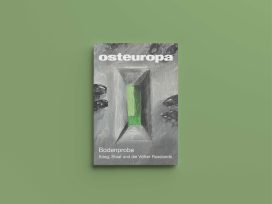
Internal empire
Osteuropa 1–3/2024
Why the Russian Federation is a de facto empire despite the 1993 constitution; why Putin’s imperial but anti-ideological variety of Russian nationalism dominates; why Chechnya remains an open wound on the body politic; and feeling the impact of the Putin regime’s clampdown on intellectual freedoms.
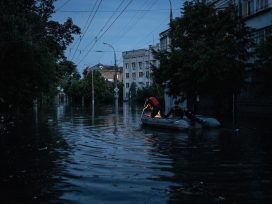
‘Occupation is like a flood. The water doesn’t reach every house at the same time. First it covers the roads until it meets an obstacle – a wall or a fence. Then it starts to rise, finding cracks, seeping further, conquering one house after another, together with everything inside them.’




